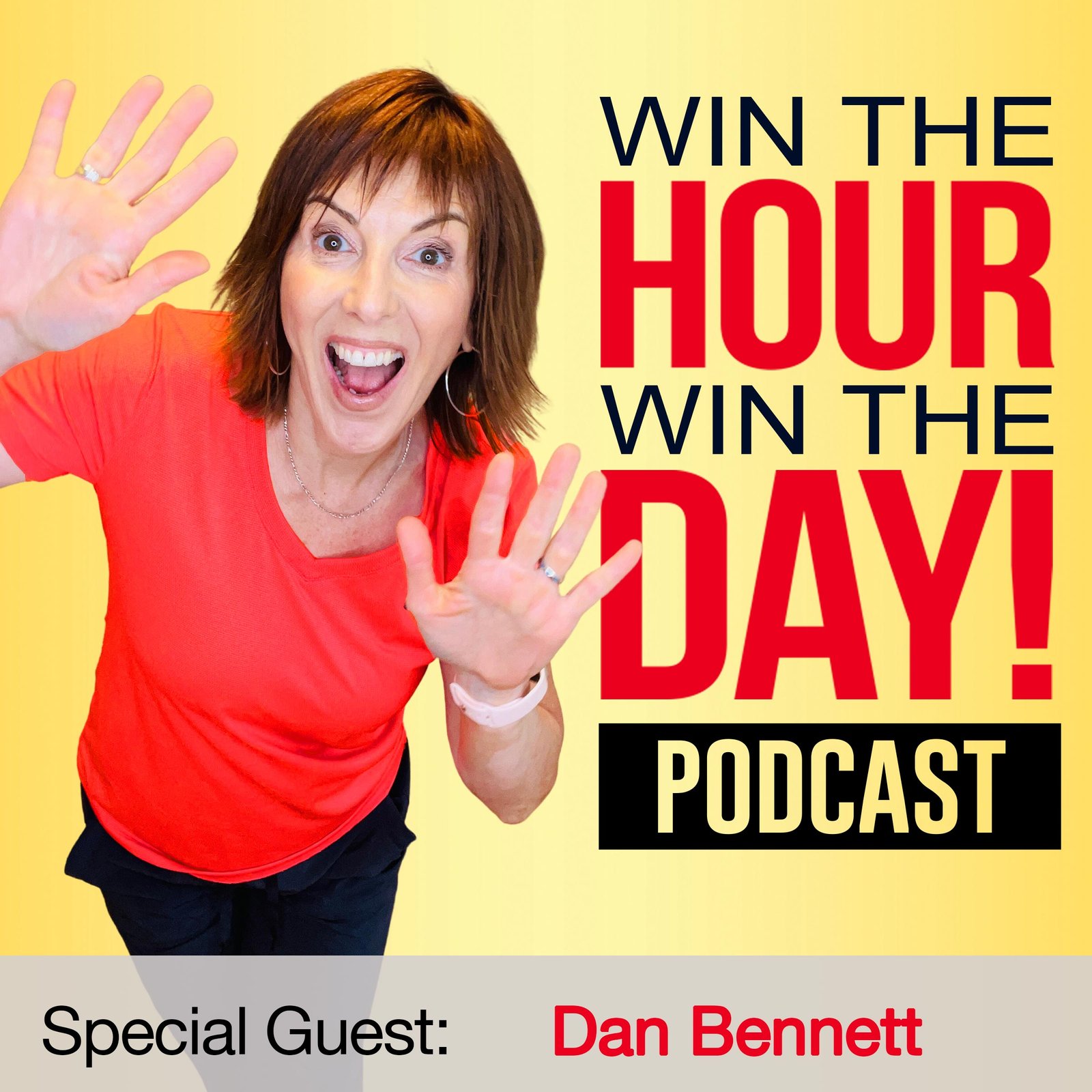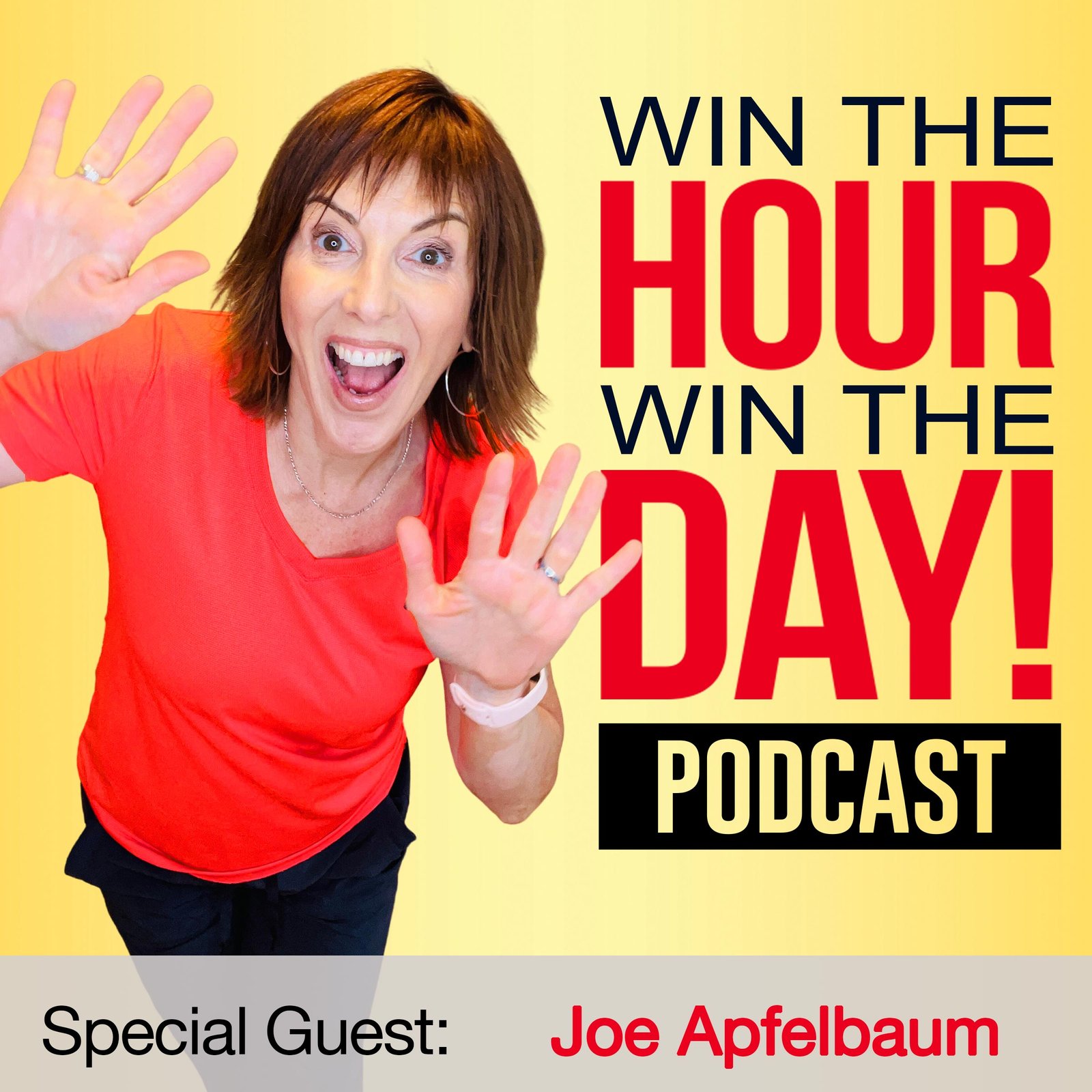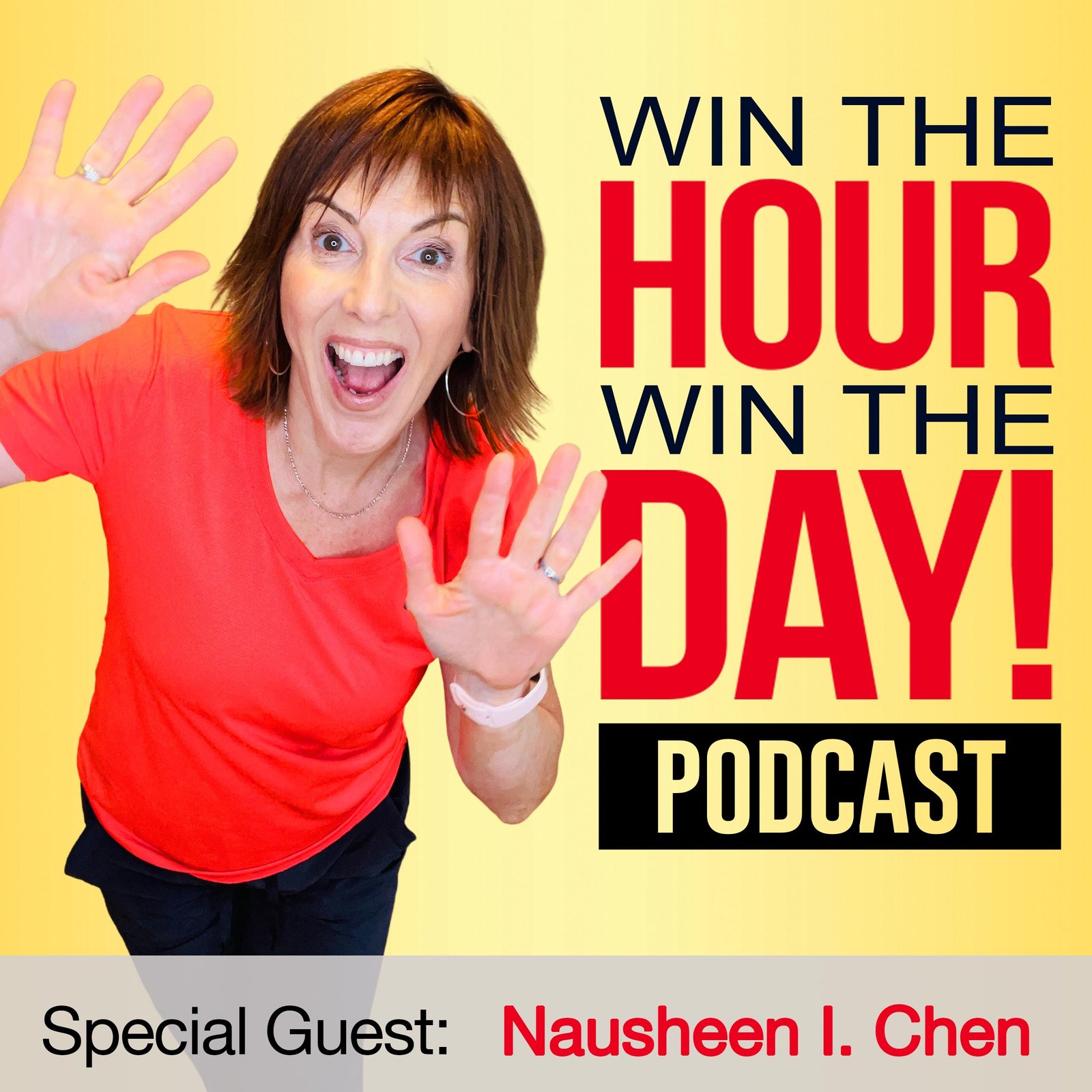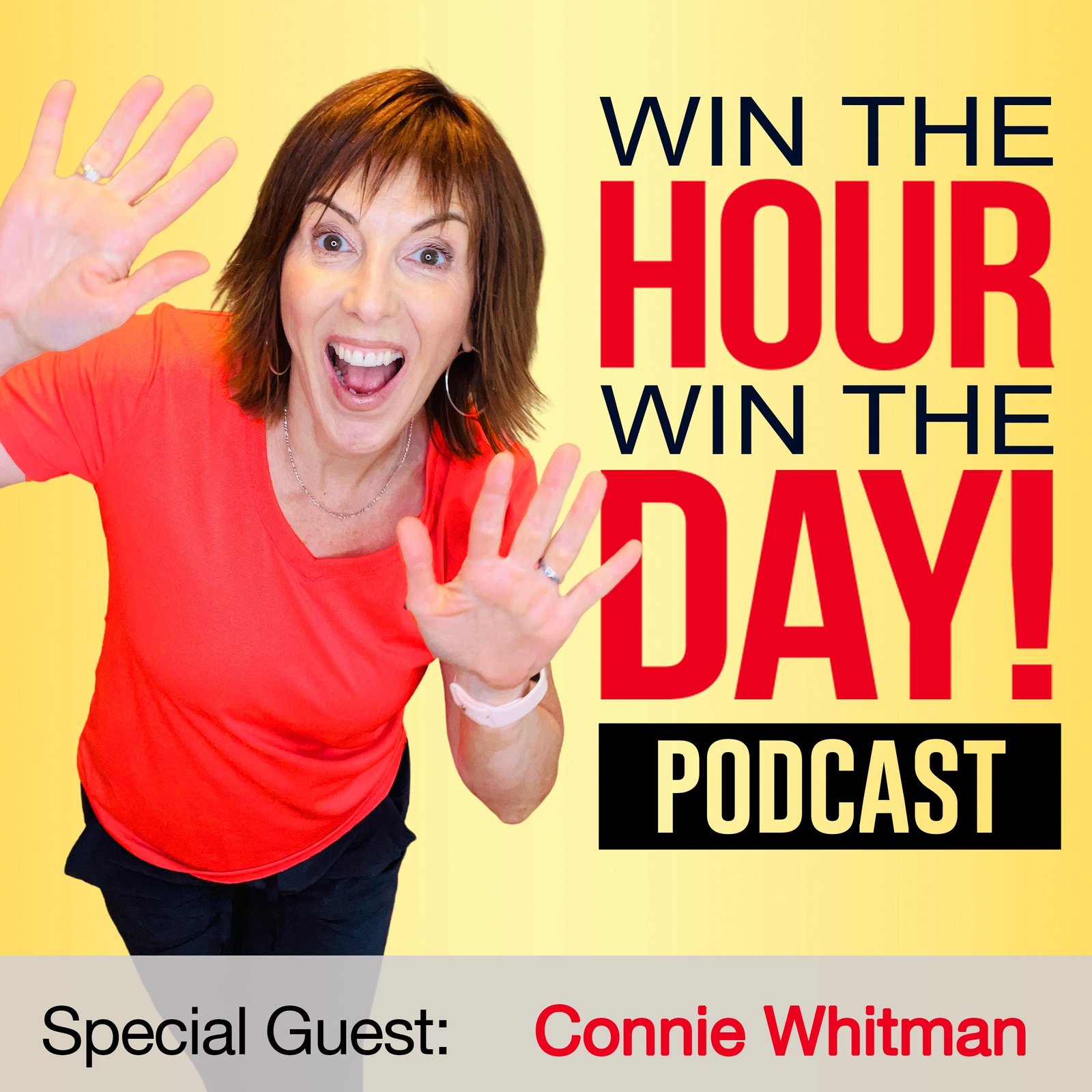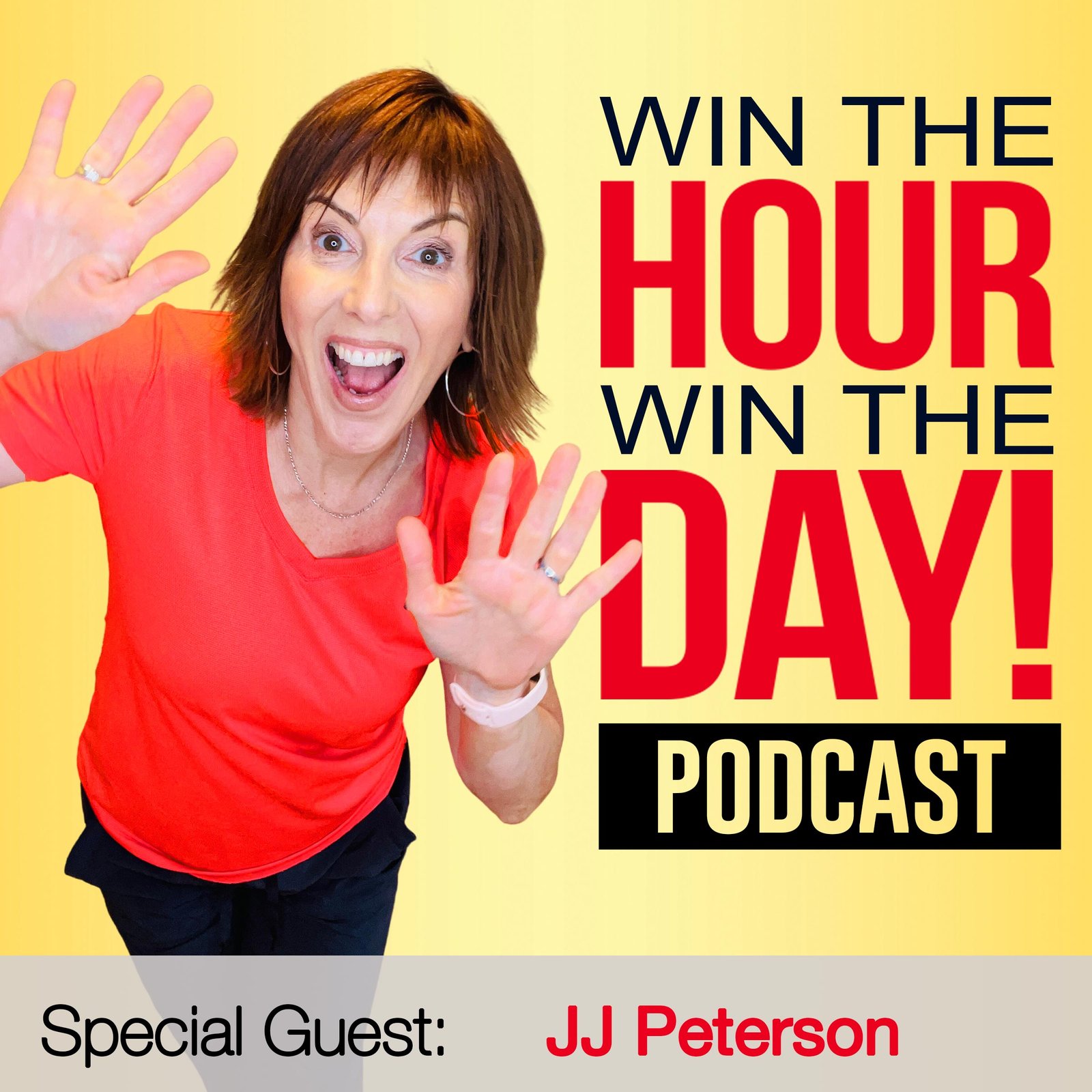Episode Summary This week’s episode of Win The Hour, Win The Day Podcast is...

Are You Ready For Your Next Big Win?
Know your entrepreneur personality and I’ll take it from there!
Recent Podcast Episodes
Preventing Burnout with Smart Work Tools! with Kris Ward
Episode Summary This week’s episode of Win The Hour, Win The Day Podcast is...
Master Social Selling: Heidi Medina’s Strategies for Engagement
Episode Summary This week’s episode of Win The Hour, Win The Day Podcast is...
Boost Productivity and Master Storytelling! with AmondaRose Igoe
Episode Summary This week’s episode of Win The Hour, Win The Day Podcast is...
Master Video Marketing: Top Tips for Entrepreneurs with Dan Bennett
Episode Summary This week’s episode of Win The Hour, Win The Day Podcast is...
Boost Your LinkedIn Strategy with AI Tools for Enhanced Productivity! with Joe Apfelbaum
Episode Summary This week’s episode of Win The Hour, Win The Day Podcast is...
Mastering Personal Branding with NLP Techniques! with Olesija Saue
Episode Summary This week’s episode of Win The Hour, Win The Day Podcast is...
Innovative Lead Generation and Email Automation Secrets with Jennie Wright
Episode Summary This week’s episode of Win The Hour, Win The Day Podcast is...
PR Strategies for Diverse Entrepreneurial Impact! with Jennifer Singh
Episode Summary This week’s episode of Win The Hour, Win The Day Podcast is...
Convert More Clients on LinkedIn with Richard Moore
Episode Summary This week’s episode of Win The Hour, Win The Day Podcast is...
Master Business Growth on Pinterest with Meagan Williamson
Episode Summary This week’s episode of Win The Hour, Win The Day Podcast is...
24/7 Sales Boost: Video Marketing Secrets with Alex Sheridan
Episode Summary This week’s episode of Win The Hour, Win The Day Podcast is...
Master Public Speaking Tips with Nausheen Chen!
Episode Summary This week’s episode of Win The Hour, Win The Day Podcast is...
Beating The Burnout With Connie Whitman’s Success Story
Episode Summary This week’s episode of Win The Hour, Win The Day Podcast interviews,...
Craft Your Social Media Content Strategy With Shannon McKinstrie
Episode Summary This week’s episode of Win The Hour, Win The Day Podcast is...
Boost Your Productivity with AI Tools: A Deep Dive with Erik Fisher
Episode Summary This week’s episode of Win The Hour, Win The Day Podcast is...
Boost Visibility: Repurpose Content and Leverage Podcasts With Christina Lenkowski
Episode Summary This week’s episode of Win The Hour, Win The Day Podcast is...
Master Personal Branding & Storytelling with Lisa McGuire
Episode Summary This week’s episode of Win The Hour, Win The Day Podcast is...
Boost Business on LinkedIn with Catherine B. Roy’s Strategies
Episode Summary This week’s episode of Win The Hour, Win The Day Podcast is...
Scale Your Business: Optimizing Virtual Assistant Services with Kris Ward & Rachel Eubanks
Episode Summary This week’s episode of Win The Hour, Win The Day Podcast is...
Affordable PR Mastery: Crystal Richard Unveils Modern Techniques
Episode Summary This week’s episode of Win The Hour, Win The Day Podcast is...
Mastering Business Storytelling with JJ Peterson’s Guide
Episode Summary This week’s episode of Win The Hour, Win The Day Podcast is...
Revamp Your About Page: Guide to Personal Branding
Episode Summary This week’s episode of Win The Hour, Win The Day Podcast is...
LinkedIn Mastery and Video Marketing Secrets with Alex Sheridan
Episode Summary This week’s episode of Win The Hour, Win The Day Podcast interviews,...
The Systems and Processes Playbook: Insider Secrets to Streamlining Your Small Business with Leah Abunales
Episode Summary This week’s episode of Win The Hour, Win The Day Podcast interviews,...
Create Content Marketing With Your Audience! with Marcus Sheridan
Episode Summary
This week’s episode of Win The Hour, Win The Day Podcast is sponsored by Win The Hour, Win The Day’s Signature Coaching Program the Winners Circle. Kris Ward who helps entrepreneurs to stop working so hard interviews, Marcus Sheridan.
Marcus Sheridan explains with great clarity the power of content marketing! This is an eye-opening experience that is a game-changer for your business!
Learn
-How to finally create content marketing that connects with your audience.
-Why most companies fail at content marketing.
-What is the fastest way to become a trusted leader in your industry?
-Why content marketing is the secret weapon to growing your business.
And MUCH more!!!!
W.I.N Time Back Quiz
https://bit.ly/WinTheHourWinTheDayScoreCard
Win The Hour, Win The Day! www.winthehourwintheday.com
Podcast: Win The Hour, Win The Day Podcast
Facebook: https://www.facebook.com/winthehourwintheday/
LinkedIn: https://www.linkedin.com/company/win-the-hour-win-the-day-podcast
Win The Hour, Win The Day Winners Circle: https://winthehourwintheday.com/winners-circle-masterclass
You can find Marcus Sheridan at:
Website: https://marcussheridan.com/
Email: msheridan@impactplus.com
LinkedIn: https://www.linkedin.com/in/marcussheridan/
Win The Hour Win The Day
https://winthehourwintheday.com
Marcus Sheridan Podcast Transcription
[00:00:00] Kris Ward: Welcome to another episode of Win the Hour, Win The Day. And I am your lucky host, Kris Ward.
[00:00:05] I know I say all the time we have amazing guests cuz we do. I really am so protective of who we bring on the show. I always wanna up my game, but today we are upping the game and then some. Now our guest doesn’t know. I have been working hard on getting him here at least six, maybe eight months. I don’t know.
[00:00:22] So let’s welcome him to the show, Marcus Sheridan, the author of the Speaker of They Ask You Answer. We are so excited, you answered and you are here. Welcome to the show, Marcus.
[00:00:34] Marcus Sheridan: Kris, it’s my pleasure. We’re gonna have a great conversation today.
[00:00:37] Kris Ward: We are, I tell you. Okay. Funny story. So many things. I read your book and I even had plans that weekend and I read a lot of books.
[00:00:47] So listen what? I read your book and I had to stop everything I was doing and cancel things, and I was in lockdown. I gotta read this book, right? And it was just so enlightening. That I call people that have nothing to do with business. Like I called my mom and I’m trying to explain to her, you don’t understand this book
[00:01:03] These people are not, they don’t care. Like they’re just, they’re doing their thing, right? People that had no interest or investment, why they should be reading this book that are totally outside the business world. I’m like, listen, what are you doing? Listen, you have to understand this book I’m reading, right?
[00:01:17] And then it was really funny. Martin Hunchback who content fortress, he was on the show and had a great chat with him. Wonderful human being. Another great book. And in that interview I had not realized you had written the forward to his book and you could actually, I felt bad for him. You could actually hear me get.
[00:01:35] Oh my gosh. And I didn’t know he did the four tier book, and so my excitement elevated to the point that I had to pull it back and apologize to Martin because oh, I sounded interested in you, but then my energy completely changed. I’m telling you people, if you, if this is the biggest gift that I could possibly give you on any level, is read this book.
[00:01:55] They Ask You Answer is a game changer like no other. And I promise Martin, I’m gonna let you talk, but I what? It’s so simple and I’m, I’ll let you explain what the book’s about because the reality is this conversation’s been had before. I’ve heard it a hundred times, but not the way you rolled it out in the book, and I changed everything.
[00:02:17] When I came back to work Monday, we had a team meeting. We then invested in SEM Rush. I invested in training. I started like everything, and I was wondering how I had been in business this long and survived without these fundamental pillars. Like I was embarrassed what have I been doing? So take it away. Where should we start?
[00:02:37] Marcus Sheridan: Yeah, so they ask, you answer foremost is a philosophy. It’s a mindset, right? And the mindset is our obsession as, let’s say, a business in this case, our obsession is our potential customers worries, fears, issues, concerns, questions, et cetera, right? And that’s a gamut of potentially positive and negative things, but you really have to start with that.
[00:03:01] And then the mindset is, we feel like it’s our obligation to address those worries, fears, issues, concerns, et cetera, through text, through video on our website. And then there’s a sales side as well, of course, integrating that content very intentionally to the sales process. Now you might hear that, you might say that sounds, pretty normal.
[00:03:21] Sure, I answer people’s questions on my website, but if you’re really honest with yourself, most of us don’t, at least not the most fundamental buyer based questions that people have or the worries that they have when they’re considering a product, a service, a company, et cetera, right? And so that’s the essence behind they ask you answer is the willingness to lean into those and to not ignore them.
[00:03:46] Whereas most companies do. We call that ostrich marketing in the book or the ostrich berries, it’s head in the sand and thinks the problem or the question is gonna go away, but it never goes away. Questions like cost, for example, every buyer when they’re researching B2B, B2C it doesn’t matter. They won’t understand cost to this day.
[00:04:06] And I’ve done the studies on this, Kris, unless somebody’s e-commerce still to this day, over 90% of all businesses don’t talk about cost and price on their website. Think about that for a second. All right. The very high majority of service-based businesses don’t talk about cost and price. Yet everybody wants to know why, right?
[00:04:23] So this is the book teaches you how to address these fundamental things, and if you do it, this is the key. If you do it, you will become the voice of trust within your space. So they ask you to answer is not just a philosophy, it’s a framework that you can follow so that you can become the definitive voice of trust in your space.
[00:04:44] Kris Ward: Yeah, and you do such a spectacular way of walking us through this in the book because really, and also, that comes down to answering the questions and then writing blogs, you’re like, yeah, okay, fine. I know we’re supposed to write blogs and Google eggs are page update. And I’ve heard that before.
[00:05:00] And then when you give the examples there is like you hear angels. Oh, because you start to see, oh, this is what they meant and this is what they meant when they said it gets such a deeper level of what I misunderstood of my understanding of this all these years. So it is so simplistically profound, but ever so much changing.
[00:05:19] Marcus Sheridan: Yeah. So something you said there, I think it’s really important for everybody. And that is, and this sounds a little bit trie, but I think it actually matters. For a long time, we hear the word blog and we roll our eyes.
[00:05:30] Kris Ward: Yeah. Yeah.
[00:05:30] Marcus Sheridan: So if I say to somebody, especially a business owner, do you feel like you should have a blog on your website?
[00:05:35] They’re like I don’t know. But if you say to a business owner, do you think you should address your customer’s questions, worries, fears on your website? The majority are gonna start to say, yeah, I should probably do that. And so if you watch me, if you watch me give a presentation, and if you look how the book was written, really, so many people of the years, Kris, have come to me and said, I had heard about content marketing, but I didn’t get it until I read your book.
[00:06:03] The reason for that is because I didn’t use a lot of the traditional phrases. It was just a matter of what does the buyer want? The buyer wants to understand things they want their questions answered. They want ’em answered now, they want to work with or learn from somebody that’s honest, transparent, unbiased, and there’s certain patterns that all buyers have.
[00:06:25] They wanna know certain things. So if you can lean into those, if you can address those on your site, more honestly, more transparently than anybody else in your space, you’re gonna take off. You just do. We see it over and over again, regardless of the business, regardless of how much content is in that industry, this is your great opportunity to do just that.
[00:06:43] And in fact, within the book if it’s okay, Kris, if I talk about this, there’s five subjects. That really dominate the way that we as buyers and consumers think what we research, what we want to know before we reach out to a company. So before we engage a company, we wanna understand five things.
[00:06:59] And everybody’s listening to this right now, has researched these five things hundreds of times, and we call these the big five, number one. Cost questions. Okay? We’re obsessed with understanding cost, price, budget, et cetera. Number two, we wanna understand negatives, problems. In other words, when we get serious about wanting to buy something, Kris, we wanna know what could go wrong.
[00:07:20] How could this blow up in my face? That’s the only time we really research what could go wrong. If somebody’s searching negative reviews of, for example, that’s a negative, that’s a what could go wrong. That’s because you wanna buy that thing. They wanna engage that particular thing, right? So that’s number two.
[00:07:34] Number three, we’re obsessed with comparisons. We love to compare stuff online. Your product versus another product. Your service versus another service. Your brand versus another brand. Your method versus their method. It goes on and on. All. One option that you sell versus another option that you sell.
[00:07:48] I These are all things, okay, so cost, problems, comparisons, those are the first three of the big five. And then we have reviews. We’re obsessed with reviews, but the thing about reviews is we don’t just wanna know what, why people like something. We wanna know who it’s for and who it’s not for, and who it’s not for.
[00:08:04] It’s a bigger sell. It’s like a psychologically speaking than who it is for. So the best reviews are very clear on if you fall in this category, then this particular product, this particular service, this particular company isn’t a good fit for you. And then finally, number five, we’d love to research the best, the most, the top.
[00:08:22] Think about how many times you’ve gone to Google and you’ve searched those phrases, hundreds of times. So we’ve got cost, problems, comparisons, reviews, and best. Those are the big five. And the content on your website should essentially, if you said, if we looked at all the content on your site right now, I would tell you that 75 plus percent of it should address directly, indirectly, those five things.
[00:08:47] But if we did an audit on most companies websites that’s listening to this right now, we would find that the average person, less than 10% of their content addresses those things. And this is why you’re struggling to generate the trust and certainly the leads that you should be from your website because everybody’s addressing the thing that you’re addressing. But you know what, nobody’s addressing those five things I just described.
[00:09:11] Kris Ward: Ooh. Okay. Hold on. So much to unpack there. You’re right, I am minimizing it, understating it and devaluing it and skimming over it by calling blogs cuz it, that has been beaten to death. And content marketing is really the word there.
[00:09:26] I will also say that when I was going over my notes from today, cuz I made so many notes, so much more than I had any other book I’d written, I highlighted, I repurposed stuff, I sent it to my team. I did everything. And then today when I was looking at it, I was like, damn, Kris, that’s great. You need to reread this book.
[00:09:41] Because I had this eye-opening awakening thing. It changed a lot of behaviors, but now it’s like there’s so much there. I really think this is something you probably could reread every six months. Just wanna tell you that. Also too, I think you brought up some powerful points that we, or I can speak for myself, you get so invested in, let’s say, I entrepreneurs get 25 hours back a week within the first month of working with us, is what I hear all the time.
[00:10:08] So I wanna jump to maybe what something like here you can have outsourcer and so affordable, but you’re right, even as you’re talking, I realizing. People often come to me and they’re stressed out. They’ve been in business a long time. They’re they’re working more hours than they should be at this point in the journey.
[00:10:23] And one of the first questions I don’t talk about in any of my content marketing is they’ll say well, how much more time is this gonna take me, Kris? I’m already maxed out. And I have to explain to them, listen, you’re gonna get more time back every week. This is not a regular thing where you now have to add extra, I gotta learn this and it’ll be fine in six months.
[00:10:41] But that’s such a basic question. But I skip over that to what I think is the media more valuable question to them of oh, this is gonna give you your life back, or all these things that I think are important and I’m stepping over entry level questions and not writing about them. And that’s powerful content marketing, cuz that’s where they’re at. And that was one of the many awakenings I had in your book.
[00:11:06] Marcus Sheridan: Kris, when I was. For those that don’t know, I own up a swimming pool company called River Pools. I started in 2001 and almost lost it in 2008, 2009 when the economy crashed and when the economy was crashing and I was ready to file bankruptcy, that’s when I really started to lean into the internet and study things like inbound marketing, content marketing, all that stuff.
[00:11:28] And what I heard in my mind was Marcus, they ask you, answer it. That was where the framework came from. Now, the thing about it was, is up to that point in my career, I’d been in the game since, starting this company now for about nine years. My answer to problem was always work harder, which you’re incredibly familiar with.
[00:11:48] Yeah. Work harder, like just grind it out. You’re gonna, if you just work harder, it will just fall into place. And sadly, that’s oftentimes not the case. In fact, sometimes it’s the definition of insanity, right? Yeah. And so the beauty behind pain like I was in, is that it forced me to do things that I never would’ve probably done, right?
[00:12:10] . And so I started to do this. They ask you answer, and I’m like, geez, this is exactly what we should do. And truth be told, at the time, I didn’t have the time to do that. And I went to my wife and I said to her, All right. I think in order to save the business, I need to start answering our customers questions online.
[00:12:33] I need to write articles. I need to produce videos, and I said I need to do this at night when everybody goes to bed, cuz I, I want to continue to see you and the kids at least a couple hours a day. And so for two straight years, Kris, I, instead of going to bed at 10 ish, I started going to bed at 12:31, whatever it took in the morning.
[00:12:53] Now I don’t recommend that to most people, but what happened was because of that, I would become the most trafficked swimming pool website in the world. And it led to this unbelievable explosion of our business. And today that business is just a massive multi multimillion dollar company. But it started with this framework, start with the mindset of obsess over a customer’s questions.
[00:13:18] What’s interesting though is once we started to do this, I started to get all the time back, lemme just give you an example. . It’s really fascinating. I was if I may, just because you brought this up and I think it’s so applicable to your audience, and one of the things that we talk about in the book is assignment selling. Now what is assignment selling? It came from this discovery that I had in like 2014 ish when I was looking at two groups of people from our company’s website. And both of these groups had filled out a form. And said, I wanna get a quote. So I said, what’s the difference between the ones that fill out a form, say I wanna get a quote and buy, versus the ones that fill out a form, say, I wanna get a quote and don’t buy.
[00:13:57] And so quickly, I realized that the number 30 had kept jumping out underneath the group. That had bought a poll and that 30 represented total pages viewed. And so let me explain. What we found was if somebody read 30 or more pages of the website before the initial sales appointment, they would buy 80% of the time.
[00:14:19] If they didn’t read 30 pages of the website or more before the initial sales appointment, they would buy 25% of the time. So all I had to do as a, in my case, a business owner was get someone to go from the normal to 30 pages of content and if they just consume 30 pieces of our content. I knew they were gonna buy four outta five appointments 80% of the time.
[00:14:42] So I said, my gosh, this is it. This is how my life changes. And so I started to
[00:14:49] Kris Ward: Hold on. Are people reading 30 pages about building a pool? That’s a lot of pages
[00:14:53] Marcus Sheridan: You would. You would think. But what we have found is once you lean into these five subjects that people care most about, right? And by the way, with under the big five, there’s like dozens and dozens of pieces of content that you could be producing.
[00:15:08] So what we’ve found in every industry, because we work with companies all over the world doing the Ask Me, I’ve got an agency that does this, and all we do is help companies and works. Do they ask, you answer? And so we’ve seen that there’s this like tipping point of content where if you produce the right content, number one, you’re shocked at how much they’ll consume.
[00:15:27] And number two, you’ll find that there’s a tipping point number that if they hit it, boom, closing rates go through the roof. And so in our case, we started to get very intentional about integrating content into the sales process, saying things to you, let’s say you were a prospect, Kris. I, you called me up and said, Hey Marcus, I’m looking at pools.
[00:15:46] I’d say, I’d love to come out to your house and meet with you about a pool, but you’re getting ready to spend a lot of money. And if you’re gonna spend a lot of money, I know you don’t wanna make any mistakes, and so as to make sure you don’t make any mistakes, I’m gonna make sure you’re well educated. So here’s what’s gonna happen, Kris, as we’re talking on the phone right now, I’m gonna send you two things via email that you’re gonna love.
[00:16:04] The first thing I’m gonna send you is the video that shows you the entire process of that pool being installed in a backyard. This way you’re gonna see exactly what it looks like. And when I come out to your house, you’re not gonna say to me, so Marcus, what does this process look like? You’re already going to know.
[00:16:15] Now time out. That just 30 minutes on the sales appointment. So far, if I’m going on, let’s say five sales appointments a week, I’ve just saved two and a half hours that week just because they’ve consumed that one video. Now getting back to the call, the second thing I’m gonna send you, Kris, is a guide.
[00:16:30] This buying guide’s great because it’s gonna answer a lot of questions that you have about pools that nobody has been willing to address or nobody’s bothered to address yet? Should I get a cover with my pool? What’s the best type of cover? Should it be mesh? Should it be solid? Should it be automatic? Should it be solar?
[00:16:44] Should it get a heater? What’s the best type of heater? Should it be gas? Should it be electric? Should
[00:16:48] Kris Ward: Okay, hold on. Can I jump in here for a sec?
[00:16:50] Marcus Sheridan: Yes.
[00:16:51] Kris Ward: Because it’s so e, we all think our business is different. So when you start talking with something tangible like pool, we think, oh, it’s different.
[00:16:56] But the what’s now coming up into my brain, which I think I’ve totally missed about completely. So like I said, people say okay. How do people work with you, Kris? Is it one-on-one? Is it group and then I, we have this academy where they can watch replays or they get all these extra resources and there’s really a whole bunch of jewels in there that the clients really love.
[00:17:12] So that, you think that comes after we’ve had the sales call and they show interest. But that could be in my initial email saying, and this is what it would look like. So it, cuz I don’t want people to get stuck. I’m thinking well, I’m not a mechanic or building a pool, but just the process of working with them, you can show that in your initial communication instead of thinking it’s linear after the
[00:17:34] sales call.
[00:17:35] Marcus Sheridan: Yeah. So it can come at different times. So in this case, I know if you do that we call it an assignment, right? If you do that assignment before I come out to your house, you’re gonna buy 80% of the time. Okay? Now with my agency, somebody calls us and says, Hey let’s say it’s a marketer and the marketer says, we are I’m so into they ask you answer, but my CEO, he or she hasn’t read it yet.
[00:17:57] And can you jump on a call with us and explain to them? They ask your answer and maybe we can do business. And my answer’s no. I’m not going to do that. Now, if your CEO wants to watch this video about they ask you answer first or read the book first, then I will meet with you. Yeah. But if I get on that call and try to just be a missionary, all of a sudden, their job in their mind is to resist, whereas, Unless they have skin in the game, then it’s not gonna be a good sales call for my agency. So we’re not gonna do a sales call unless the decision maker has invested some time him herself. Now, I’m not saying that everybody here listening this should do it exactly that way, but here’s what I am saying.
[00:18:44] When I was still selling pools back in the day, and this is the crux of the whole assignment, selling conversation when I was selling pools back in the day, like in let me see, 2007 before I was doing the “ask, you answer” that year I went on, I sold I think it was 75 pools. And I went on about 230 sales appointments.
[00:19:06] Okay. 75 pools, 230 sales appointments. The average sales appointment was two to three hours long. The average distance from my house was two hours. Oh, I want you to do the math in your head. Yeah. Do you think I was a happy business owner in 2007, right? Yeah. My whole life was driving. . Yeah. And going to the next appointment and just getting really frustrated.
[00:19:29] So then we did “they ask you answer.” By this point I’m out of out. I’m, I have, I’m doing other things. I’ve got the pool company, I’ve got my partners running it for for us. I’ve got new salespeople. These salespeople are not as good as I am as a salesperson and one of my salespeople one year. He went on excuse me, he sold 85 pools and he went on 130 sales appointments.
[00:19:55] Now, who was happier? So he sold more and went on way less appointments. Why? Because he became a master at assignment selling. So when you start to produce this content, I want you to think about how much efficiency can it bring to your life? How much could it shorten the sales cycle? How much could it eliminate some of the customer service, customer experience issues that you continue to have?
[00:20:17] Here you continue to address some of the same issues over and over again. But if you just produced that video, you just produced that article, whatever that thing was, you could eliminate that from the fray. And that’s the key here. That’s the key. And so all of this is about, in many ways, it’s about efficiency, which is cool because that’s your specialty.
[00:20:35] Kris Ward: Okay, so I have two questions. One is, so there, I’m thinking about having a pool is different than somebody saying to me like, okay, I think I should be working this many hours. But they, in my case, they always think, oh, I need to be more organized. I need to be more disciplined.
[00:20:49] Marcus Sheridan: I don’t agree. I don’t agree.
[00:20:51] Kris Ward: So they think I don’t
[00:20:52] Marcus Sheridan: It’s the same thing.
[00:20:53] Kris Ward: So what I’m saying is if they say to me, of course it’s the same thing, I’m just wrap my head around it. So if they say, Hey, could we meet? And then I guess I could send an assignment information about, it’s not about discipline, it’s not about organized. Do before they even meet with me, do I then send them the video, what the academy looks like, the whole journey of what it would look like working with me? Or does that come off
[00:21:18] Marcus Sheridan: good question.
[00:21:19] Kris Ward: As a little presumptuous?
[00:21:20] Marcus Sheridan: No. So here’s how you would wanna approach it. You wanna ask yourself, Kris?
[00:21:24] Kris Ward: Yeah.
[00:21:24] Marcus Sheridan: What are the questions that either A, they ask every single time. Making the call like Groundhogs Day.
[00:21:31] Kris Ward: Okay.
[00:21:31] Marcus Sheridan: That’s number one. Or what are the questions they should already be asking and should therefore already know before we get on the call.
[00:21:40] Kris Ward: Okay.
[00:21:41] Marcus Sheridan: The problem that we have is oftentimes when we’re in that sales setting, that we’re spending way too much time teaching, not enough time selling.
[00:21:50] Kris Ward: Yeah.
[00:21:50] Marcus Sheridan: And so how do we bring efficiency to this process? We eliminate redundancies, right?
[00:21:55] Kris Ward: Yeah.
[00:21:55] Marcus Sheridan: And so if you talk to most salespeople and you say when I say salespeople, anybody that’s listening to this, it’s an entrepreneur salesperson, right?
[00:22:01] Kris Ward: Yeah.
[00:22:01] Marcus Sheridan: So if I say, okay, what percentage of the questions you get on a first call are pretty much the same questions every time? The majority say something like, ah, 70 to 80%. Okay.
[00:22:12] Kris Ward: Yeah.
[00:22:12] Marcus Sheridan: So what if we could eliminate those 70 to 80%? How would that change your first call, your second call, whatever it is, how would that change your sales process? It would change it dramatically, wouldn’t it?
[00:22:23] Kris Ward: Yeah.
[00:22:23] Marcus Sheridan: And so that’s what. That’s one of the reasons, one of the fundamental reasons why we do this.
[00:22:29] And plus that’s just what buyers want, right? And there’s an interesting, psychological component to this, which is sunk costs. So the more somebody spends time researching content that you produced, right? As the more they have invested in you, therefore the cost, they’ve sunk more the cost, there’s more invested in you, that’s sunk cost.
[00:22:49] And so therefore, they’re actually looking for reasons to work with you at that point.
[00:22:54] Kris Ward: Yeah, I think what it is, we all have this inventory and at the most simplistic level, which is oversimplifying it, you are showing us that whatever, it’s like we’re just giving them the inventory in the wrong order at the wrong time, and it’s very time consuming on our behalf, and it’s very confusing to them because then they have to digest all this information in one sitting and it’s ridiculous.
[00:23:16] It’s so unbelievable. Okay. The learning never stops with you. I’ve just had my brains exploding. Another thing that I would love to tap into a little bit here is that for the longest time, we heard that if you put the best way to slow down business is put your price on your website because people will not understand the value.
[00:23:34] Okay, what are they shopping for? They don’t have value awareness of what is this worth? And so you don’t buy into that as far as dollars go. Can we talk about that for a moment?
[00:23:47] Marcus Sheridan: We can totally talk about that for a moment. Okay, so cost and price. I have helped companies, large and small, some really huge ones.
[00:24:00] Cross this barrier of discussing costs on their website all over the world. And I could tell you that there’s three fundamental reasons why businesses don’t talk about cost and price on their website. Number one, they say every job is different and therefore it depends. We have a very varied, bespoke solution, et cetera, et cetera.
[00:24:18] The answer to that one is this. If I came to you and I said, Hey Kris, can you help me understand the factors that would drive the cost of working with you up? You’d say, sure. If I said to you, Kris, can you help me understand the factors that would keep the cost of working with you down?
[00:24:29] Could you explain that? You’d say, yeah, sure. If I said to you, Kris, you gave me a quote to help solve my problem, and I also got some quotes from others in your industry to solve my problem. Some of you are more expensive, some of you’re less expensive. Can you help me understand why there’s a delta in the industry?
[00:24:41] And the answer would be, sure, you could explain that there’s different degrees of service that they are receiving from these different companies. And then finally, if I said to you can you at least give me a sense for where you fall? You’d say, sure. Of course I can. And so the, it depends, is one of the easiest to address.
[00:25:04] It’s one of the most important because by explaining what drives costs up in your industry, what drives cost down. Why are some companies so expensive? Why are some companies so cheap and roughly where do you fall in this range? Just roughly by doing that, you give them more than 99% of your competitors and now you’ve explained what constitutes value in the marketplace.
[00:25:25] What leads to commoditization, which is what you mentioned when you started this question, Kris, is we’re worried that we’re gonna commoditize what we sell. They won’t see the value. That means we’re worried we’re gonna commoditize. The thing that leads to commoditization of a product or service is when the marketplace is ignorant of that thing, and they see one or two or three of those things from three different companies. They don’t think there’s a difference between the service or the product. And because they’re uneducated, because they don’t think there’s a difference, what do they do? They choose the cheapest one. That is commoditization. So that’s the first reason why we don’t talk about cost and price. It depends. That’s the easiest and most important to address. Second reason. We don’t talk about cost and price as we say, stuff like I don’t want my competitors to find out, which is really ridiculous because if I said to anybody that’s listening to this right now, do you have a pretty good sense as to what your competitors charge?
[00:26:14] Everybody that’s listening to this right now would say, yeah, of course I do. I’ve got a pretty good sense. And so if you’ve got a good sense of what your competitors charge, of course, therefore means they have a good sense as to what you charge. This is the big secret non-secret everybody acts like nobody knows what everybody’s charging.
[00:26:27] When you’re at reality. Everybody has at least a decent sense as to what everybody else is charging. And besides that, when was the last time your competitors paid your bills? Ridiculous, right? Yeah. Third reason why we don’t talk about cost and price. We say things like we tend to be more expensive, and if we’re more expensive, We just might scare them away.
[00:26:43] But the thing that actually scares us away in the buying process isn’t when they educate us and teach us about cost and price. This is why they don’t talk about it. It’s when they leave the page blank. It’s just if you were vetting a restaurant to go to tonight, and you looked at their menu, which is what most people do before they go to a restaurant where they really wanna have a good experience.
[00:27:03] If there’s no pricing, you don’t go to the restaurant, right? At least 80 per plus percent of people don’t go. It’s not because you can’t afford it, it’s because the moment they let the menu blank, they plan a seat of doubt. Now, somebody listen to this right now, sadly, is literally sitting there saying, that’s a restaurant.
[00:27:16] That’s not my business. Folks, if that is your mindset, you eventually will fail as an organization because until you learn to connect principles instead of disconnecting them from how they apply to you and your business. The companies and I, cuz I’ve been all over the world. Speaking, teaching the whole nine Kris, the companies that are doing the most exceptional things, they don’t sit there and say they’re different.
[00:27:43] What they do is they say, the psychology that drives our buyer is the psychology that drives all buyers. Yeah. We just have to figure out how to tap in for our thing. And their problems. And their needs their way. It’s beautiful, the ones that get it, it’s crazy.
[00:27:58] Kris Ward: It’s a rookie thing. If you think your business is different, that’s a rookie statement and I’ll just throw that.
[00:28:02] Marcus Sheridan: Lemme give you another rookie statement. Somebody reads, they ask you answer. Here’s how I know somebody’s gonna fail. They ask you answer. Somebody reaches out to us and says, I read the book man. I’m really excited about it.
[00:28:15] But I’d really like to see some others in my industry that are doing it. The most successful companies I’ve ever worked. They literally aren’t giving one ounce of thought to if anybody else yeah. Has to. They don’t need proof of concept. They’re like, okay, so you’re telling me I need to be honest.
[00:28:30] I need to be transparent. I need to address their questions, where his fears, issues, concerns. If I do that, it totally makes sense. Why would I not do that? They don’t need to watch or look at their competitors. Websites or videos or social platforms, they’re saying, this is true. I need just obvious. You read it Kris, and you were like, I don’t know.
[00:28:49] I need to, you never said I need to see some, some others in in, in my field that have done this. You were like, dude, why are we not doing this?
[00:28:57] Kris Ward: Yes. If I had been less responsible, I would’ve had a team meeting on a Sunday. Like everybody . Stop what you’re doing.
[00:29:03] Marcus Sheridan: That’s funny.
[00:29:04] Kris Ward: So let me ask you this. I don’t know if this is too specific when we talk about the pricing, and I think that’s something huge because we’ve been misinformed about that for so long. Is this too specific a question? So when we talk about pricing on our website now, is that in like over in the content marketing thing? Oh, we do, we put it on the main page, like here’s the price and here’s why. Like how
[00:29:24] Marcus Sheridan: Yeah.
[00:29:24] Kris Ward: Is that how do we architect that?
[00:29:26] Marcus Sheridan: Okay. This is very important. I’m glad you asked this, Kris, because number one, everybody for their website should have what we like to call a learning center or a learning hub or a knowledge center. But this is where you essentially have your content library, okay?
[00:29:39] And your potential customers can consume your content in their preferred method. And what I mean by that is ideally you have, what would be called educational articles, and that would be your traditional blogs. That’s one category or section of your learning center, so educational articles.
[00:30:01] Number two would be video library, okay? . all your videos. Number three would be case studies. Number four could be things like calculators or assessment tools. Number five could be for certain industries, white papers. Number six could be, let’s say, podcasts. So these are different ways that people can learn from you.
[00:30:18] And you might say to me right now Marcus, I haven’t done any of those. I know, but you’re going to, and eventually you’re gonna build out a robust library. So number one, you wanna have a learning center, and ideally you’re consistently pointing to the learning center. So let me give you an example. So let’s say you have a product that you sell.
[00:30:36] Or a service that you sell. So let’s say I’m a HubSpot guy with my agency, and so we’ll say HubSpot Consulting is a service that we sell. So if I have a HubSpot Consulting page, I might have a series of questions, I should have a series of questions on that main service page. And those questions are the fundamental questions that people are gonna ask about HubSpot, for example.
[00:30:59] How much does it cost to receive HubSpot training? All right, so that would be one of my first questions listed on that page. That question is gonna link to the educational article.
[00:31:11] Kris Ward: Oh, okay.
[00:31:11] Marcus Sheridan: Found in the learning center. That addresses HubSpot cost. And so all the other questions that somebody might have about HubSpot, right?
[00:31:20] They might be asking HubSpot versus Salesforce, which is the best CRM for me? Okay. That was the verse Plus a best right there. That once again is going to link to an article or a video.
[00:31:31] Kris Ward: So you might have on page one, it’s at the bottom or wherever, frequently asked questions, and they will link to the library.
[00:31:37] Marcus Sheridan: Not FAQs. Generally. Not FAQs.
[00:31:39] Kris Ward: Okay. How are we getting that question?
[00:31:40] Marcus Sheridan: Yeah. Yeah so there’s a few different ways to do this because if you think about FAQs, . There’s two types FAQs. There’s FAQs about your company, and then there’s FAQs about the service and products that you sell, right? And if you really get serious about FAQs, you ain’t got enough room on one page to address the hundreds that you actually have.
[00:32:03] So it’s gotta be super organized. So number one, what you want to have is one of the elements of your navigation bar. You wanna have your like learning hub, or learn or learning center, knowledge center, or whatever you wanna call it on your main homepage. You wanna have a very vibrant section. That points them to your learning center.
[00:32:24] So if you are listening to this right now, go to the River Pools website, which is RiverPoolsandspas.com. Okay? You’re gonna quickly see our learning hub. Now, the cool thing about that Learning hub on the homepage, you’re gonna, you’re gonna see it and it’s gonna have a bunch of social proof. So it’s gonna say something like, 300 plus videos, 700 plus art, educational articles, 30 million
[00:32:46] re viewers, right? So quickly you’re gonna holy crap, I’ve reached the mecca, the Wikipedia of in-ground fiberglass swimming pool information here. . And then you can click on the learning center and as soon as you hit the learning center, first thing you’re gonna see is that big search bar like you were on Google, that search bar.
[00:33:02] Kris Ward: Oh, okay. Okay.
[00:33:03] Marcus Sheridan: That search bar is
[00:33:05] Kris Ward: Okay.
[00:33:05] Marcus Sheridan: our site search, okay, that’s gonna take you, that’s gonna allow you to search all things content we have created within our learning center. And again, you’re listening to this, you’re saying, gosh, that sounds intimidating, folks. Brick bright. Brick buy brick. Just like a house.
[00:33:20] Just like your home. Yeah. Okay. And so I wrote one article every day for two years until we had the most traffic swing pool website in the world. And so you don’t wanna set out, to say, I’m gonna go write an ebook today, that’s 30 pages. No. Write a cost article today that eventually that cost article’s gonna go in that ebook that you’re gonna be using tomorrow.
[00:33:38] That’s where you start brick by brick. And the bricks will build the wall, and the wall will build the house, right? So that’s where you wanna do it. One other thing about this too, is you wanna have pricing generally as a tab in your navigation bar. Okay? And so you have pricing and they click on that.
[00:33:54] You’ll see that’s one of the, that’s the most clicked on tab in your navigation bar by far. And then, ,you’ll have depending on how many services and products you offer. Once again, now you’ve got l questions or links to the specific pages in the learning center that do a deep dive on cost for that thing.
[00:34:17] Now, if you only sell one product, my pricing page might have how much does a fiberglass pull cost? But then it’s got some related articles that send you, again, to the learning center. But if you sell multiple products or services, then you’re gonna want to have your just general intro paragraph, right?
[00:34:32] Okay. If you’re here, there’s a good chance you’re looking at any of the following services. So if you just click on the following, you’ll better find a definitive pricing article or video on each of the items you see below, right? And so if you have five main services you have as a company, you might have each one of those services listed out.
[00:34:51] And then again, it goes now to, what is that learning center where you have some of your pricing content.
[00:34:58] Kris Ward: Oh my gosh. Okay. And so here, one last question. Keep you till Monday. Would, I’m writing a blog once a week is oh, forgive me as a bad word. Now to my mind, content marketing. I’m doing one content marketing piece.
[00:35:13] Marcus Sheridan: Yeah. You’re doing one educational, I would call it like this. Yeah. I’m producing one educational article or video a week. Okay. That’s an example of the way that like when we talk about it within companies, yeah. That’s the way that we would describe it.
[00:35:24] Kris Ward: Okay, so I’m doing one per week. Two questions. One Is that enough or I guess the faster you wanna go, the more you wanna do. And B, where we have in the past prescribed to the language of blogs, do you have a length or it doesn’t matter as long as you get the content out. And I’m still thinking old school blogs.
[00:35:42] Marcus Sheridan: Yeah. And not to beat this, I just wanna make sure everybody is listening Yep.
[00:35:45] Fully understands. Yeah. Google has never gone to your website and said, oh, that’s a blog And that’s their main page. Google sees every page of a website as the same thing. It’s just another page. Okay. So they’re not thinking, this is a blog article. And in a perfect world, when somebody’s on your website, they’re not thinking, oh, I’m on their blog right now.
[00:36:06] They just, they’re just flowing in and out of content, right? Because it’s just, again, so very fluid and easy to do. Now, in terms of the numbers, the logistics some is always better than none, but there are tipping point numbers because I’m into analytics and patterns, and we’ve seen this because we have so many crazy case studies.
[00:36:26] So we do know that there’s a certain number when it comes to quality and quantity that leads to explosive growth. Okay, now this assumes the content they’re producing follows what you read and they ask you answer right to not some fluffy junk that ain’t nobody asking about. Yeah, this is like big five plus other stuff.
[00:36:45] Okay, so here’s what we know to be true, that if somebody produces three articles a week for 18 months, they will be at the top of their industry online, right? We know that to be true. Now you say, gosh, Marcus, that’s a big ask. I don’t have a lot of sympathy because, I did it every day for two years when I just wanted to go to bed because I was gonna lose my company.
[00:37:08] I was gonna lose my home. And that’s just the life that I that’s where I was at that point. Now, I don’t recommend that to people today I recommend, okay, hire recent journalist graduate at a minimum of 20 to 40 hours a week. Have them interview you and put that content on the screen, right? Much simpler.
[00:37:29] Very effective. And you can do that for a really decent rate. Could you outsource it? You can, but generally what you’re gonna find is you’re not gonna get the phenomenal results if you outsource it. So for example, tell me one company. Become the Wikipedia of their space, like river pools, for example by outsourcing their content, you ain’t gonna find
[00:37:52] Kris Ward: Yeah, I don’t buy, I don’t buy into that. I’ll tell you one thing you can do that I think really matters, and people underestimate this all the time, is I just go to a Google page blank and I hit, there’s a tool and you hit transcribe. And when you just talk, if you answered your own question, you have a lot more to say, heck, you do it quicker.
[00:38:07] And you do it so it doesn’t sound dry like an essay, and then you can just hit that and edit it. So that’s how I start my content marketing is, it’s great way to do it. Audio. Yeah. You’re done.
[00:38:15] Marcus Sheridan: Yeah. It’s a great way to do it. Yeah. There’s different ways that you can become efficient and of course, let’s not even get started with, chat AI things yeah.
[00:38:23] That are out there, that are, know, that. But just, the key though is that you want to have personal stories within the content of things that you’ve experienced within the business with your customers beyond just answering the question, should it have a certain number of words?
[00:38:36] The answer is yes. Okay. For example, if a company works with us, we don’t accept, cuz we review everybody’s content that we work with as part of like our engagement. We don’t accept an article that’s less than a thousand words. Okay? And you’re like, geez, why would you not accept an article? Because the average number one ranked page in Google search engine results is about 1400 words.
[00:38:55] Okay? Most pricing articles when they’re done the right way, like I said earlier, with those five parts, they’re usually 2000 words or more. The fact of the matter is search engines actually like meat am potatoes and qualified buyers they do too. And so this idea of everybody just wants everything short.
[00:39:11] That’s just not, that’s not necessarily true. Sure, we got a TikTok world, but the idea that people’s attention spans are shorter, is completely false. We’re not goldfish. . What’s shorter or less is our patience, right? We’re not patient with stuff that we don’t feel drives value, and so therefore we gotta make sure it’s driving value.
[00:39:28] So there’s a qualitative and a quantitative component to world class. But if you said, Marcus. I wanna do the ask, you answer. I’m gonna do it once a week. I’d say Good for you. That’s great. You’re going to outperform many of your competitors that don’t do it at all. But if you want to explode, yeah, let’s go with that. Make your whole life three week and two months.
[00:39:50] Kris Ward: All right. I don’t even have time to talk to you, Marcus. I gotta write two more content pieces for this one for this week. Okay? Oh my gosh, Marcus, I tell you, I was not kidding. I was so excited when I connected with Martin and then he connected me to your assistant and I worked out as much as I could for a couple months and you were busy and I didn’t get anywhere.
[00:40:10] And then I was chiming in on conversations, LinkedIn and you made a comment and I made a comment to your comment and listen LinkedIn work cuz I got him here. This has been, I such a treat. And I read the book and it was so exhilarating and enlightening and powerful and so it’s present it in a different way than you’ve ever heard before.
[00:40:28] And then I was just thrilled to have you here and really just tell you the work. You don’t need me to tell you how great your work is and it’s life changing, but I wanted to personally tell you about my life and then you show up and you, I was expecting great, but we went from great to super excellent on steroids.
[00:40:44] So man, this has been a treat. Thank you so much for all that you do for your amazing book and for over overdelivering in this time. Where can people find more of your brilliance?
[00:40:56] Marcus Sheridan: Thank you, Kris. The pleasure was certainly all mine. If you’re listening to this right now, make sure that you follow me on LinkedIn cuz I’m a dang good follow.
[00:41:04] And that’s the one social media platform that I’m actually on and I pay attention to. And if you have a question for me directly, just you can email me. The easiest one to remember is marcussheridan.com. That email is also in my book. They ask you answer and I hope you read the book.
[00:41:19] Because it will change your life. Yeah. Especially if you’re open-hearted, open-minded, you’re just gonna say, man, why are we not doing this? This is so obvious. And that’s a good thing because if you’re thinking that, it means it’s attainable and you need to go with your gut. So Kris, again, thank you for having me on your podcast today.
[00:41:37] Kris Ward: Oh, thank you. And everyone else, we so appreciate your reviews. We love to hear them. We read every one of them. And if you can pass this podcast onto just one other person, it will be so helpful to them. Do them a favor, and until then, we’ll see you in the next episode.





